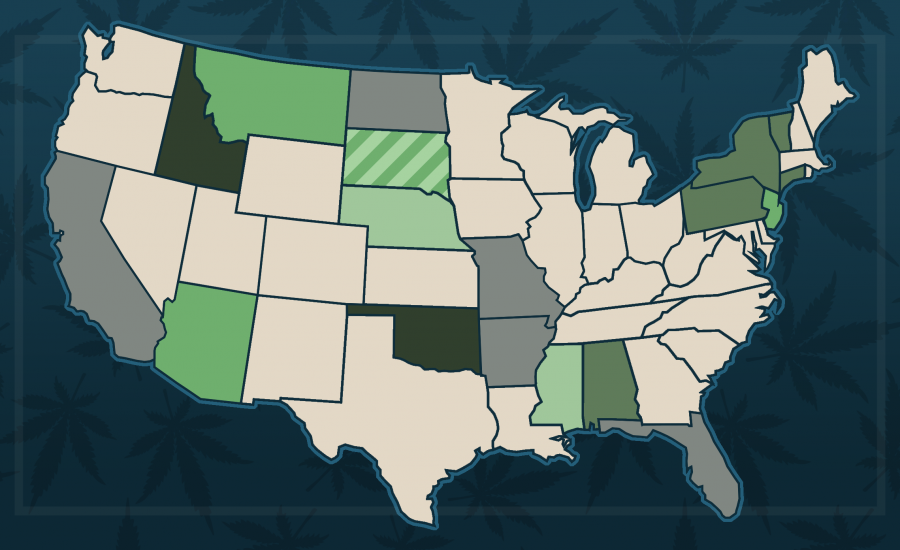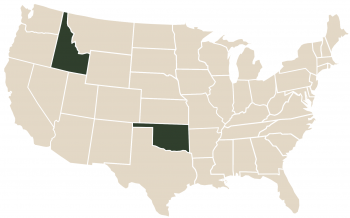Written by Tyler Elder and Luke Ewing
![]()
As we hear every election cycle, the election of 2020 will be the most important election of our time. But what about the importance of this election to the cannabis industry? For a while, it looked like we would have a flood of new states voting on— and likely passing– marijuana initiatives. 2020 has been an extremely impactful year on the industry, but not in the way we expected. During the pandemic and ensuing shutdowns in cities across the country, cannabis was recognized and designated as an essential business, and its employees as essential workers. And, thanks to social distancing requirements, retail businesses began operating under emergency regulations that actually relaxed many of the unnecessary restrictions on conducting sales. And, as if that wasn’t enough, the industry, and the nation as a whole, has seen a renewed push for social equity.
On the other hand, the social climate that caused those changes was not quite so beneficial to signature gathering campaigns in several states we initially anticipated seeing ballot measures. Here’s our update on how marijuana legalization is faring in the run-up to November, broken down into four categories: states that will be voting on either medical or adult-use initiatives this year; states where initiative efforts are still active, but on life support; states that could still take the legislative route to legalization; and, states who have given up on cannabis legalization in 2020 altogether.
States Voting on Marijuana in 2020
This year has proven to be a mixed bag for cannabis reform; while the pandemic made signature gathering efforts challenging in many states, it didn’t hamper a number of other state’s efforts to reform cannabis laws. There will be at least six
states in which citizens can vote on some type of cannabis reform in November. This year will also be the first time we see a state face a vote on both medical and adult-use cannabis at the same time!
Adult-Use Marijuana Initiatives
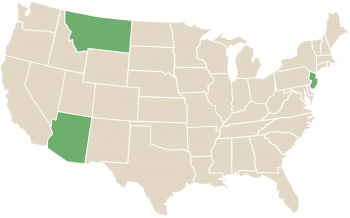
On the adult-use front, at least four states will be voting on marijuana in 2020.
Arizona
After a failed attempt to get authorization to gather signatures electronically earlier in the year, Smart and Safe Arizona submitted 420,000 signatures to qualify an adult-use legalization measure for the ballot this year. That’s 180,000 signatures more than they needed to qualify, so odds are that Arizonans will see the measure on the ballot in November.
If it passes, anyone aged 21 or over could buy cannabis from licensed retailers and would be allowed to possess up to one ounce. The measure would also allow adults to cultivate up to six plants for personal use. There are also provisions that would establish a social equity program and open up expungement opportunities to those with prior cannabis convictions.
Though recent polling shows that a majority of likely voters support the measure, opponents in Arizona aren’t giving up yet. A recent lawsuit filed in Maricopa County argues that the short description of the measure misled people into signing petitions. If the challenge is successful, judges could prevent the measure from appearing on the ballot regardless of whether activists collected enough valid signatures to qualify.
Montana
New Approach Montana overcame the challenges of signature gathering during the pandemic and submitted enough signatures to qualify two measures for the ballot this year. The measures are not competing, but rather complimenting.
The first measure is a statutory change that would legalize an adult-use market in the state. The second measure is a constitutional amendment that would limit an adult-use market to those 21 and older. If the first measure passes, and the second doesn’t, then an adult-use market would be open to adults 18 and older, which would be a first for cannabis legalization in the U.S.
New Jersey
The first state to commit to having legalization on the ballot was New Jersey, and it happened way back in December 2019. In a rare change of pace, the state legislature decided voters should face the question of legalizing cannabis in November. If voters approve, New Jersey will amend the constitution to legalize cannabis for adults 21 or older. If polling is any indication, the measure seems likely to pass.
Medical-Use Marijuana Initiatives
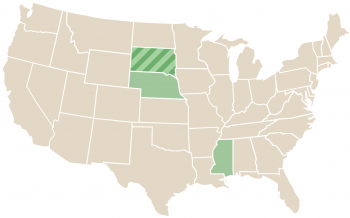
On the medical-use front, we’ll see at least three states voting on marijuana in 2020.
Mississippi
Mississippi is one of several states in which voters will have more than one choice for legalization on the ballot this year. Way back in January, Mississippians for Compassionate Care submitted enough signatures to qualify a proposal to legalize medical cannabis for the November ballot. The initiative would allow patients to access cannabis after receiving a doctor’s recommendation for at least one of 22 qualifying conditions. Patients would be able to buy up to two and a half ounces in a 14-day period.
In Mississippi, lawmakers can approve, reject, or amend initiatives that qualify for the ballot. No matter what, the initiative will appear on the ballot, but if lawmakers amend it, they can add a competing measure to the ballot. If both pass, the measure that receives the most votes will go into effect. This is the strategy that Mississippi lawmakers have decided to go with this year.
The alternative option that state lawmakers have submitted is more vague. One major change is that the legislature-backed measure restricts smoking cannabis to patients who are terminally ill. Critics believe the measure was left intentionally vague so that lawmakers could create a more restrictive program if it passes.
Nebraska
The Cornhusker State is also likely to see a medical-use initiative on the ballot this November. After pausing their signature gathering efforts due to COVID-19, activists restarted their campaign in May with new safety protocols in place. Earlier this month, they turned in 196,000 signatures –121,669 of which will need to be deemed valid to qualify for the ballot.
Nebraska’s measure would allow patients to buy, possess, and cultivate cannabis for personal use after obtaining a doctor’s recommendation. State officials are expected to announce whether the initiative qualified for the ballot sometime in August.
The First State to Go for Both
South Dakota is in a land of its own this year. Unlike other states, South Dakota has the opportunity to skip over medical cannabis and jump straight to legalizing adult-use. Activists in the state submitted enough signatures to qualify two separate measures for medical-use and adult-use for the ballot this year. Both measures are supported by the same groups.
At the end of 2019, the South Dakota secretary of state confirmed that activists submitted enough signatures to qualify Initiated Measure 26 for the ballot this November. The measure would legalize medical cannabis and allow patients to buy and possess up to three ounces at a time. It would also allow patients to grow three plants, or more if a doctor authorized it.
Just one month later, a constitutional amendment to legalize adult-use qualified for the ballot. Amendment A would create a regulated market and allow anyone over 21 to buy and possess up to one ounce at a time. It would also require state lawmakers to create regulations for medical cannabis and hemp by April 2022.
State Marijuana Initiatives on The Struggle Bus
Oklahoma received a win when its Supreme Court allowed a Recreational Marijuana initiative to move forward in spite of Paul Tay’s claims that the initiative is unconstitutional. Unfortunately, due to the delays while in court, it looks unlikely that the group will be able to gather the necessary 177,958 valid signatures and have them vetted in time to be on the ballot. Technically, they have 90 days from the date the court gave them approval to gather those signatures, but supporters of the initiative do not feel safe gathering signatures during a pandemic.There has been mention of voting on the initiative in 2021, but that would require calling a special election, which is unlikely to happen under a governor who is not considered friendly to the industry.
Idaho’s deadline to get Medical Marijuana on the ballot passed on May 1, but signature gatherers are still holding out hope. On June 23, a judge ruled that Idaho must either give 48 additional days to gather signatures for a different state ballot initiative (concerning school funding), or place the initiative on the ballot in spite of the fact that they have less than the required number of signatures. Rather than bringing their own lawsuit, the campaigners for Idaho’s marijuana initiative instead petitioned the state for equal treatment. The Secretary of State responded with the following dismissive statement:
“Since the Idaho Constitution vests the Idaho Legislature with the authority to establish the laws under which initiatives are qualified for the ballot, your client should request that the Legislature change these laws,” [Secretary of State] Hancock wrote. “If it is critical that your client’s initiative be placed on the November 2020 general election ballot, as opposed to the November 2022 general election ballot, they should also request that the Governor call a special session of the Legislature immediately, in order to pass these law changes with an emergency clause, enabling them to be effective for the November 2020 general election.”
Considering the State is currently appealing the judge’s ruling on the school funding initiative, it shouldn’t surprise you that it is holding an equally stubborn stance with regard to the marijuana initiative. About a week ago, the campaign stated that they had 45,000 (unverified) signatures and could quickly obtain the necessary 55,057 verified signatures if they are granted an extension and are allowed to gather electronic signatures. It doesn’t look too bright for Idaho, but we’re still holding out hope that they’ll pass (or, at least be able to vote on) medical marijuana in 2020!
States Pursuing The Legislative Route for Marijuana in 2020
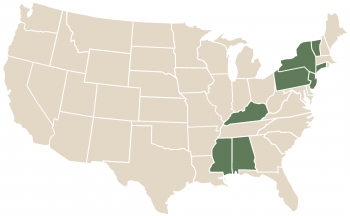
As we saw in Vermont and Illinois, states don’t always have to change marijuana law through popular-vote referenda; they can also get it changed through the legislative process. In fact, only 23 states allow citizen-initiated ballot initiatives, so in many states, this is the only way to pursue legalization or reform.
While Vermont, which doesn’t allow citizen initiated questions on the ballot, had previously used its legislature to legalize adult-use cannabis, it hadn’t authorized sales or commercial licenses. This year, a bill authorizing a legal market and licensing is making its way through the legislature and looks likely that it will make it to the governor’s desk in the coming months.
Although New Jersey’s Assembly technically failed to legalize cannabis during their last session, they did pass a measure which will allow the people to vote on legalization in November. Mississippi’s legislature has placed its own medical marijuana question on the November ballot alongside a citizen-initiated one. The legislature’s question uses broader language than the citizens’ one, and activists are concerned that it will be used to confuse voters and will be used to enact a more constrained medical program if the legislative question is approved.
New York keeps insisting that it will legalize marijuana this year. Governor Cuomo even vowed that it will pass in 2020. It is still possible that the legislature will get itself together in time, but after they failed to include it in the budget, we’re not holding our breath. Pennsylvania has a number of bills bouncing around, a supportive populace, and vocal support from the Governor and Lt. Governor. And, in Connecticut, the governor sponsored a bill that would legalize adult use marijuana, but the legislature adjourned before voting on it.
Lastly, Alabama’s Senate and Kentucky’s House of Representatives both approved medical cannabis bills, but full legislative approval has been delayed by the pandemic.
States That are Shifting Focus to 2022
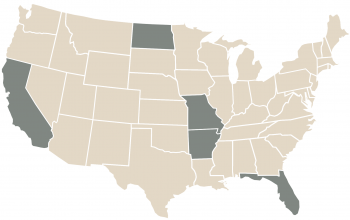
On the other hand, several states we’ve been watching were unable to meet the challenge this year, likely in large part due to the pandemic and other economic priorities, and have suspended their reform campaigns.
Arkansas
Arkansans suspended their attempt to legalize adult-use cannabis earlier this month after failing to collect enough signatures ahead of the early-July deadline. The group blames COVID-19, saying the pandemic kept them from collecting signatures in the same way they would normally rely on. The group plans to pursue another adult-use campaign next year.
California
Early this year, Californians were pursuing an initiative that would have made several changes to their marijuana laws. Among the changes, they would have increased possession amounts, restricted regulation beyond similar rules for beer and wine, limited retail taxes to 10%, and legalized hemp. Additionally, the measure would have expanded expungement opportunities and released some prisoners currently serving time for cannabis and hemp convictions. However, activists did not submit signatures for the initiative before the deadline, and it did not make the ballot this year.
Florida
Florida activists suspended their 2020 attempt, not because they were unable to collect enough signatures, but because the timeline to verify the signatures was too short. Make it Legal Florida claims they submitted more than 700,000 signatures to put an adult-use measure on the ballot this year, but that there wouldn’t be enough time to verify the signatures before the ballot deadline. Polling shows a majority of Floridians support legalizing cannabis, and the group plans to focus on a 2022 vote.
Missouri
After passing a medical initiative in 2018, Missouri activists were looking to legalize adult-use this year. However, due to COVID-19 and the challenges it posed for signature gathering, Missourians for a New Approach was forced to end their 2020 campaign before they could collect the signatures required to make this year’s ballot. They are now looking toward the 2022 ballot.
North Dakota
Activists in North Dakota missed deadlines earlier this year to get an adult-use legalization initiative on either the November 2020 or June 2022 ballots. After missing the November 2020 deadline, they continued gathering signatures for their proposal, aiming for the June 2022 ballot, but due to North Dakota’s signature-gathering expiration policy (groups only have a limited amount of time to gather signatures once an initiative is submitted), the group missed the deadline for that as well. They haven’t given up on the June 2022 ballot though, and plan to restart their campaign with an identical proposal. With the new attempt, they will have until December to gather enough signatures to make the ballot in 2022.
